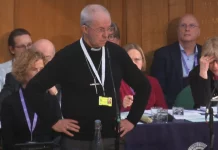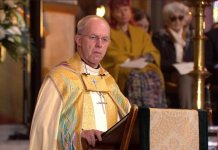OF the many lives recorded in Biblical stories, that of John the Baptist stands out. He was six months older than his cousin Jesus of Nazareth, but other than the events around his birth, recorded in Luke’s Gospel, we are told nothing of his early life. His father, Zechariah, was a priest of the division of Abijah, so John would have been instructed in the Hebrew scriptures from childhood. By birthright he too would have been destined for the priesthood and would have acquired a good social standing, priestly garb and the right to participate in the Temple feasts and rituals in Jerusalem. However things turned out very differently: it was prophesied before his birth that he would go ‘in the spirit and power of (the prophet) Elijah . . . to make ready a people prepared for the Lord’.
His ministry began probably in his early thirties. Eschewing the comforts of city life and his priestly destiny, he went into the desert clad in the most basic clothing, and eating only locusts and wild honey. He preached only two sermons that we know of: a baptism of repentance for the forgiveness of sins; and that he was only the forerunner of one who was to come after who was of far greater power and significance. He was literally no more than ‘a voice crying in the wilderness’. But despite this inauspicious start the biblical record states that thousands from the whole region of Judea, and from the capital Jerusalem, went out to hear him, multitudes being baptised in the river Jordan.
The religious elites of his day also came, but he was vitriolic in his denunciation of their hypocrisy. ‘You brood of vipers’, he railed, but fortunately for him there were no Hate Speech laws in those days otherwise he would undoubtedly have been prosecuted. Nevertheless he spoke fearlessly against King Herod, and this led to his downfall. Herod had him arrested and although he was clearly challenged by John’s preaching the king was tricked during a drunken party by his wife and Salome, his stepdaughter, into having him beheaded, a story depicted by many artists.
The question arises as to why the rather basic preaching of this hairy, unkempt man, his leathery skin burned brown in the sun, caused such an outpouring of religious fervour in the Jewish population at that time? The answer surely is that the people recognised an authentic prophetic voice coupled with an authentic lifestyle. He was very definitely not one of the religious elites. Also there had been no prophetic voice in the land for four centuries, the last being Malachi, and there was literally a ‘famine of hearing the word of the Lord’, words spoken by the prophet Amos three centuries before Malachi. Under the Roman occupation the religious festivals and rituals of the temple continued, but God seemed to be silent and the people were spiritually hungry for reality.
Which brings me to the present, and to the Venerable Doctor Miranda Threlfall-Holmes, the newly appointed Anglican Archdeacon of Liverpool. She recently tweeted: ‘Let’s have anti-whiteness, and let’s smash the patriarchy.’ This outburst, resulting from her attending a conference on ‘whiteness’, prompted a litany of outrage in the media, her comments being described as racist, divisive and nonsensical. Her views on the patriarchy are certainly odd given that the first words of the Lord’s Prayer, taught by Christ, are ‘Our Father’ which seems very problematical for someone who wants to smash the patriarchy. She has, of course, backtracked and stated that her comments were part of a more nuanced discussion. Yea, yea, but out of the abundance of the heart the fingers tweet (to misquote Christ).
However it is not my intention to perform an ad hominem attack on the Venerable Doctor (apologies for the patriarchal expression). According to her online profile she seems a pleasant lady, clearly highly intelligent, very qualified, liberal in theology and a vociferous supporter of the various shibboleths currently gripping the Church of England. She is obviously irritated by the pesky theologically conservative Anglicans who oppose such matters as same-sex marriage. The issue is whether or not, on the basis of her pronouncements, she is perceived as an authentic spiritual voice in today’s world.
I am not suggesting that she is comparable in any way to the Baptist who was the final prophet of the Old Testament. Indeed she is part of the priestly elite that John despised, and no doubt a regular visitor to the ecclesiastical outfitters and a guest at the top tables. Given her support for women bishops I suspect she is interested in climbing the greasy pole of the Anglican hierarchy.
John preached an uncompromising message of a baptism of repentance for the forgiveness of sins. Yet many of today’s issues which were previously regarded as sins are now celebrated as virtues. For example pride was regarded as one of the seven deadly sins, yet today the Pride flag flies from some cathedral flagpoles, and drapes the altars. From my reading of her online postings it seems that the Venerable Doctor regards whiteness as something intrinsically sinful from which we need to repent, and she is one of many among the Church of England elites of our day who believe the same.
She exemplifies the current problems facing the Church of England which is that as far as many are concerned it speaks not with a clear, authentic voice, only the babble of noise reflecting the many woke issues of today, but with a veneer of clericalism and religious language applied liberally. As in the Baptist’s days the religious elites seem totally disconnected from the people they are supposed to serve which is as far from ‘a voice crying in the wilderness’ as is possible.
In my town there are at least four lively, independent churches, all conservative evangelical in theology, and each with very ethnically diverse congregations, (whiteness does not seem to be a problem). The large Anglican church in the centre of town holds coffee mornings and the usual poorly attended services, but with little discernible life.
Read it all in the Conservative Woman










